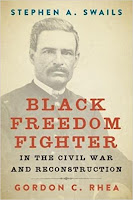New Arrival:
• Stephen A. Swails: Black Freedom Fighter in the Civil War and Reconstruction by Gordon C. Rhea (LSU Press, 2021).
Gordon Rhea's Stephen A. Swails is the newest volume in LSU Press's Southern Biography series, which has been producing titles since the 1930s. That makes me wonder what the longest-running university press book series might be.
Born free in Maryland in 1832 to mixed-race parents, Stephen Atkins Swails was 31 years of age when he made the life-changing decision to enlist in the 54th Massachusetts and was appointed first sergeant in Company F. Swails fought with the regiment in Florida and South Carolina, and he was promoted to second lieutenant in 1864 (though official War Department approval was not received until 1865). According to Rhea, this made Swails "the first African American commissioned as a combat officer in the United States military."
Like many other Union veterans, Swails elected to remain in the South after the war. In South Carolina, Swails "held important positions in the Freedmen’s Bureau, helped draft a progressive state constitution, served in the state senate, and secured legislation benefiting newly liberated Black citizens. Swails remained active in South Carolina politics after Reconstruction until violent Redeemers drove him from the state." After securing government employment in the nation's capital for a time, Swails returned to South Carolina. He passed away in Kingstree, SC in 1900 and was buried in Charleston.
Unusually, the publisher set aside the standard scholarly footnotes and bibliography format in this volume in favor of combining at the rear of the book a list of quotation citations with a collection of source notes/commentary organized by chapter. Perhaps that was conceived as a way to expand the biography's popular reach. What we can be assured of is Rhea's typically deep research. According to the author, little information is available about Swails's early life, but his personal papers contain "a wealth of documents, letters, and the like..." And state and national archives provided Rhea with much in the way of documentation of Swails's time with the Freedmen's Bureau and the South Carolina Senate. Thus, "(u)npublished manuscripts form the core of this book."


No comments:
Post a Comment
***PLEASE READ BEFORE COMMENTING***: You must SIGN YOUR NAME ( First and Last) when submitting your comment. In order to maintain civil discourse and ease moderating duties, anonymous comments will be deleted. Comments containing outside promotions, self-promotion, and/or product links will also be removed. Thank you for your cooperation.